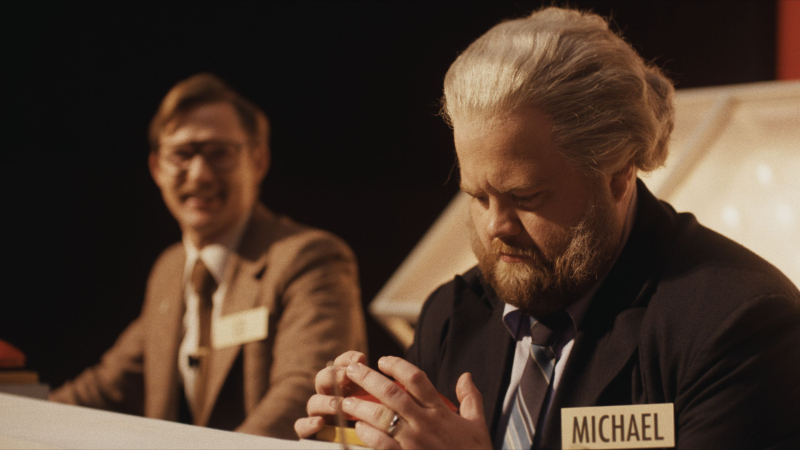
IFC Films
MOVIE REVIEW
The Luckiest Man in America (2025)
“The Luckiest Man in America,” about a long-forgotten American gameshow scandal from the mid-’80s, has landed in an exhausting moment of American history. Audiences seeking escapism from the problems of the now might enjoy a few hours’ refuge in the much lighter problems of the past. Other than that, the main appeal of “The Luckiest Man in America” is wondering why it has been made at all. Is it about how the systems are rigged against the little guy? Is it about how, when the systems are rigged, cheating becomes an honorable thing?
Michael (Paul Walter Hauser, who along with Joe Alwyn is building a fascinating career playing the kind of characters no one else wants to touch) arrives at the CBS television studios for his audition for “Press Your Luck” at the wheel of an ice-cream truck. He smooth-talks his way into a screen test, irritating the production crew (most notably Shamier Anderson and Maisie Williams) but charming the producer, Bill Carruthers (David Strathairn), who believes Michael’s storyline – this is the only way he can be with his daughter on her birthday, as she watches the show every morning before school – will be a hit. The bustling chaos of the show’s production, with the ’80s technology detailed in loving splendor, teaches us the show’s rules as Michael is positioned in the middle seat between returning champion Ed (Brian Geraghty) and fellow first-timer Janie (Patti Harrison). Host Peter Tomarken (Walton Goggins, the premier character actor of the present moment) makes some small talk and we’re off.
When Michael’s lucky streak gets underway, there’s disbelief on the set and panic in the control rooms. It’s obvious Michael is cheating, but how? Then there’s the slow realization that, as in a casino, it’s not illegal to count cards if you’re doing it in your head. Except, if that is what Michael is doing, how on earth is that possible? Senior executives stride around making proclamations, junior executives clutch their clipboards nervously; and Michael keeps riding his lucky streak forward, and forward. As the dollars mount up, so does the tension. The show is not being recorded live, so the network could just refuse to air it. They could refuse to pay out the record amounts Michael is somehow winning. But there is a live studio audience; and the amounts involved here couldn’t be hushed up. Or could they? Would that be a bigger scandal instead?
In the show breaks for commercials, the contestants pace the set while the warm-up comedians chat with the audience and everybody backstage worries about their careers. Director Samir Oliveros, who cowrote the script with Maggie Briggs, keeps the pacing high, and the parts meaty; Johnny Knoxville of all people even cameos toward the end. Lulú Salgado’s production design provides a strong flavor of workaday life in the 1980s without ever veering into kitsch, a fine achievement. But as the film tours the festival circuit, including the Glasgow Film Festival, before its American release, the questions remains: What is this movie trying to say; and why has it in the present moment been made?
The surprising answer is that “The Luckiest Man in America” doesn’t know. At no point is it clear whether the fact that the unpleasant, gauche Michael was seemingly able to outwit the game is a good or a bad thing. At no point is it clear whether we’re meant to sympathize with the show workers who are convinced there’s a fix, or the show producers who are mainly concerned about how much money they are in the middle of losing. We’re certainly not meant to sympathize with Michael, who is introduced telling lies and who, worse, believes them. So the question remains: What is the point of watching a movie where all that can be said for all the people involved is that they deserve each other? This is what prevents “The Luckiest Man in America” from being a great movie. As the current moment of American history is making brutally clear, you always, always have to know which side you’re on.
Comments